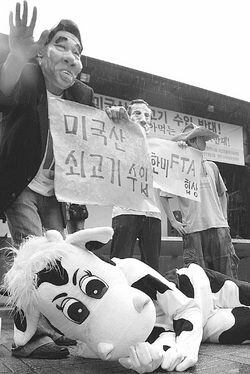hankyoreh
Links to other country sites 다른 나라 사이트 링크
[Editorial] Korea gives up a lot at FTA talks

The first round of talks on a free trade agreement (FTA) with the United States has come to an end. Agreements were drafted for eleven of the fifteen issues negotiated, while discussion on the remaining four--agriculture, quarantine and inspection, textiles, and trade remedies--will continue.
As expected, the Americans had strong, aggressive demands and Korea’s negotiators were quite accommodating. Financial services will be permitted without being required to establish in-country incorporated entities or branch offices. When it comes to the automobile sector, about which the Americans are applying a great deal of pressure, Korean negotiators said they would consider changing emissions duties.
Meanwhile, the American delegates disregarded Korean demands that products made at the Kaesong Industrial Complex in North Korea be recognized as "Korean-made," citing the political obstacles in doing so. Regarding designating products’ country of origin, as well as the early removal of tariffs for textiles, the U.S. countered with calls for the adoption of safeguard measures. There was no favorable response regarding the biggest obstacles for exports to the U.S., which are anti-dumping and countervailing duties. The only accomplishment worthy of note is the abolition of the commodities handling fee, which represents just 0.21 percent of industrial products exported to the U.S.
Both delegations are speaking positively about this first formal round of negotiations. At this stage, it is time to do the numbers on the profits and losses that are going to result. It would be hard to assign the results a lot of significance, since there are deep divisions between Seoul and Washington even on the sectors already being drafted up.
Overall, however, it looks like Korea gave up far more than it came away with. The fact that drafts were not written for sectors that would be to Korea’s advantage is evidence to this end. Some say that Korea’s negotiators came back empty-handed.
Even more disappointing was the attitude of the Korean negotiators. The Americans applied pressure using specific demands in areas in which they have an advantage, and in areas in which they are at a disadvantage they applied aggressive defense tactics. The South Korean side, however, consistently made it seem as if their approach was to compromise on anything, so as to keep the negotiations going, no matter what. The South Korean delegation, however, said the key is actually going to be turning around the opinion of those in the public who oppose an FTA; the negotiators also accused street protesters in Washington of being harmful to Korea’s national interest.
The second round of negotiations is going to be held in Seoul next month, at which time each side will begin the ritual of exchanging follow-up proposals. We already know what the results are going to be if Korea continues with the same low-level posturing it demonstrated when it accepted a lower "screen quota," or percentage of domestic movies that must be shown in Korean theaters, U.S.’s precondition for the FTA talks. It must be remembered that Korea’s interests cannot be protected with an attitude that makes it seem as if Seoul is obsessed with getting any kind of agreement signed.
Editorial・opinion
![[Column] Season 2 of special prosecutor probe may be coming to Korea soon [Column] Season 2 of special prosecutor probe may be coming to Korea soon](https://flexible.img.hani.co.kr/flexible/normal/500/300/imgdb/original/2024/0426/3317141030699447.jpg) [Column] Season 2 of special prosecutor probe may be coming to Korea soon
[Column] Season 2 of special prosecutor probe may be coming to Korea soon![[Column] Park Geun-hye déjà vu in Yoon Suk-yeol [Column] Park Geun-hye déjà vu in Yoon Suk-yeol](https://flexible.img.hani.co.kr/flexible/normal/500/300/imgdb/original/2024/0424/651713945113788.jpg) [Column] Park Geun-hye déjà vu in Yoon Suk-yeol
[Column] Park Geun-hye déjà vu in Yoon Suk-yeol- [Editorial] New weight of N. Korea’s nuclear threats makes dialogue all the more urgent
- [Guest essay] The real reason Korea’s new right wants to dub Rhee a founding father
- [Column] ‘Choson’: Is it time we start referring to N. Korea in its own terms?
- [Editorial] Japan’s rewriting of history with Korea has gone too far
- [Column] The president’s questionable capacity for dialogue
- [Column] Are chaebol firms just pizza pies for families to divvy up as they please?
- [Column] Has Korea, too, crossed the Rubicon on China?
- [Correspondent’s column] In Japan’s alliance with US, echoes of its past alliances with UK
Most viewed articles
- 1‘We must say no’: Seoul defense chief on Korean, USFK involvement in hypothetical Taiwan crisis
- 2[Column] Season 2 of special prosecutor probe may be coming to Korea soon
- 3N. Korean delegation’s trip to Iran shows how Pyongyang is leveraging ties with Moscow
- 4Amnesty notes ‘erosion’ of freedom of expression in Korea in annual human rights report
- 5[Reportage] On US campuses, student risk arrest as they call for divestment from Israel
- 6Korea sees more deaths than births for 52nd consecutive month in February
- 7[Editorial] New weight of N. Korea’s nuclear threats makes dialogue all the more urgent
- 8‘Weddingflation’ breaks the bank for Korean couples-to-be
- 9[Column] Has Korea, too, crossed the Rubicon on China?
- 10[Column] Park Geun-hye déjà vu in Yoon Suk-yeol